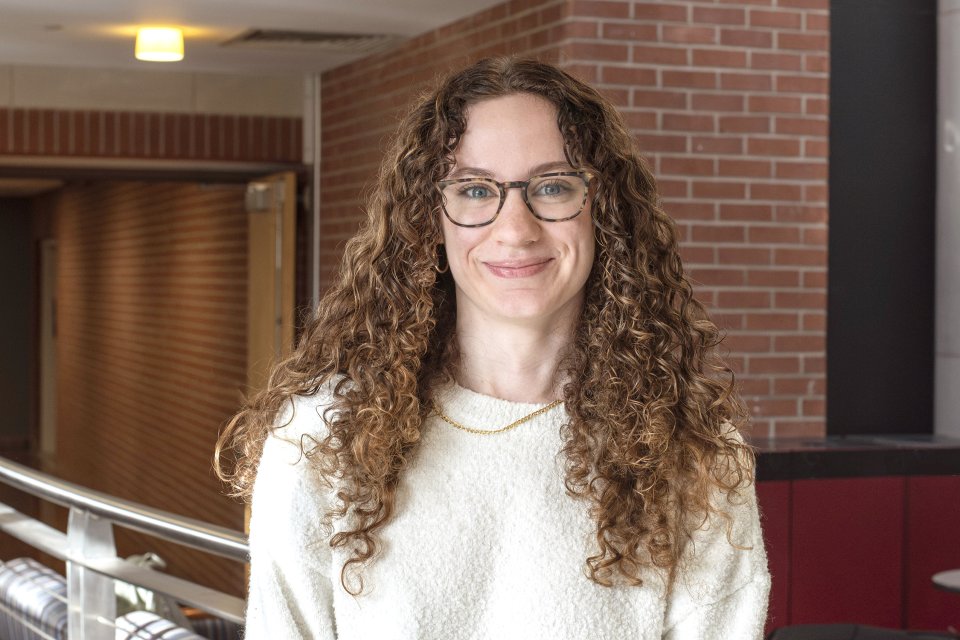
Rhyme and Reason: Isabella Dienhoffer '26

“His class hooked me.”
She is, by all accounts, the first Nursing-English dual major ever enrolled at Utica. It’s an unconventional double major pursuit, to say the least. Then again, little about Isabella Dienhoffer’s college journey can be described as conventional.
Dienhoffer '26 graduated high school in three years instead of the traditional four. What’s more, she had already earned a college associate’s degree before receiving her high school diploma from Sherburne-Earlville Central School. She completed her associate’s through a combination of high school advanced placement courses, dual enrollment courses through Tompkins Cortland Community College, and online and in-person courses after school and during the summers at Morrisville State College. As a result, she began college with junior status.
She enrolled as a nursing major at Bellarmine University, but two days before she was scheduled to start classes at the Louisville, Kentucky school, she had a change of heart. “I was 16. I was starting college super early. I didn’t want to be 12 hours, five states away,” Dienhoffer says. “I was like, ‘Wait a minute.’”
It was almost midnight when she pulled out her phone and began searching through her text messages, scrolling until she found the thread she was looking for. On the other end of the text conversation was Hawa Jibril, the Utica admissions counselor with whom Dienhoffer had spoken several times throughout her college search. “I texted her and said, ‘Hey, can we talk?’ She got right back to me,” Dienhoffer says. “I told her I was having second thoughts (about going away to college). She said, ‘You always have a place here.’”
Dienhoffer immediately found her place at Utica – a school with a reputable nursing program and a learning community that not only allowed, but encouraged her to pursue academic interests beyond her major and career path.
She was attracted to the Utica nursing program, even while electing, initially, to enroll elsewhere. “I really liked Utica when I visited campus,” she says. “It wasn’t that the program, and Utica in general, didn’t sell me. It was just that I had thought I wanted to go away to college.” Among other selling points, the structure of Utica’s nursing curriculum, unlike nursing programs at many other institutions, allowed her to easily pursue a creative writing minor.
She took English 308, Creative Nonfiction, her first semester and 309, Writing Poetry, her second. She had been an avid reader and writer throughout grade school, but it wasn’t until she took Professor Gary Leising’s poetry class that she discovered a passion and talent for writing poetry.
“His class hooked me,” Dienhoffer says. It was an unintended sequence of events – and something of a throwaway comment – that resulted in Dienhoffer adding a second major.
“I had a mid-term portfolio meeting with him,” she recalls, “and as I was leaving his office he said, ‘ Let me know when you decide to double-major.’ I was like, ‘Wait a minute, maybe he’s onto something.’”
Was he joking or was he serious?
“I mean, I was joking that she should’ve been an English major, but only because I didn’t think she would seriously pursue it,” Leising, distinguished professor of English, explains. “I knew she loved reading and writing, and she was doing a creative writing minor, but I knew she loved nursing and wants to do that for a career.”
A Passion for Writing
Leising’s poetry classes regularly include students majoring in professional or pre-professional disciplines. In fact, it’s not uncommon for construction management, cybersecurity, business, nursing, and physical therapy majors to collectively outnumber English majors. It’s a characteristic he has come to embrace over his 20 years teaching at Utica.
“The fun thing about it is a lot of them come into it thinking this is simply going to be a course to fulfill their writing requirement,” he says. “They don’t expect how much the process of learning how to write will mean to them and how much it will translate to whatever their career path is.
“For me” he continues, “the best part is at the end of the semester. Instead of giving them a final exam, I have them turn in their portfolio, revise their poems, and choose a few of them to read to the class. I’m always amazed sitting there and – whether it’s a nursing major or a construction management major or a criminal justice major – watching them present their work and seeing how invested they are in this creative thing that they didn’t think was going to have anything to do directly with their future career. It’s just really moving to see. We’re teaching them how to think; we’re teaching them about themselves and how to express ideas.”
Leising does not recall a student during his 20-year career who better encapsulates Utica’s teaching mission of blending career preparation and liberal learning than Dienhoffer.
The English courses I’ve taken here have taught me not only how to communicate effectively, but how to apply those skills in real-life situations.
“She’s the kind of student who is just so aware – I can’t think of a better word to describe it. She’s aware of everything that all of her faculty, not just me, are saying in class,” he says. “So when she comes in to write something, she’s not just trying to fulfill the assignment – and not that that’s a bad thing because those students who come in and are simply trying to fulfill the assignment often do really amazing stuff too – but she’s coming in just bringing everything from all of her classes, English classes, nursing classes, and everything in between.”
In addition to satisfying her passion for writing, Dienhoffer credits the duality and depth of her Utica education for preparing her to be a better nurse and improving the level of care she will one day soon provide.
“When I graduate, nursing will be my 9-to-5, if you want to call it that. The English courses I’ve taken here have taught me not only how to communicate effectively, but how to apply those skills in real-life situations, particularly in professional settings,” she says. “The English program here is based a lot around intersectionality and inclusivity. That has taught me how to communicate and connect with people across different cultures, which communication is a foundational skill in nursing. You want to not only communicate clearly, but connect with the person you’re speaking with, whether it’s a patient, a patient’s loved one, or coworkers.”
Last spring, Dienhoffer, who hopes to go into pediatric nursing, completed an independent study with Leising during which she authored a book of poetry she hopes to publish. It’s a remarkable achievement for someone set on a career in the health professions, but one Leising finds entirely appropriate.
“We’re a comprehensive university. This is exactly what a comprehensive university is supposed to do,” he says. “You’ve got someone who is going to be completely prepared to go into a career and do amazing things as a nurse and (at the same time) is going to have this outstanding liberal arts education.”
Learn more:
More Stories


Utica University Opens New State-of-the-Art Cyber Range

Women’s Sports Receive More Primetime Broadcast Olympic Coverage Than Men’s Sports For The Sixth Olympiad In A Row, Seventh Overall
I would like to see logins and resources for:
For a general list of frequently used logins, you can also visit our logins page.
